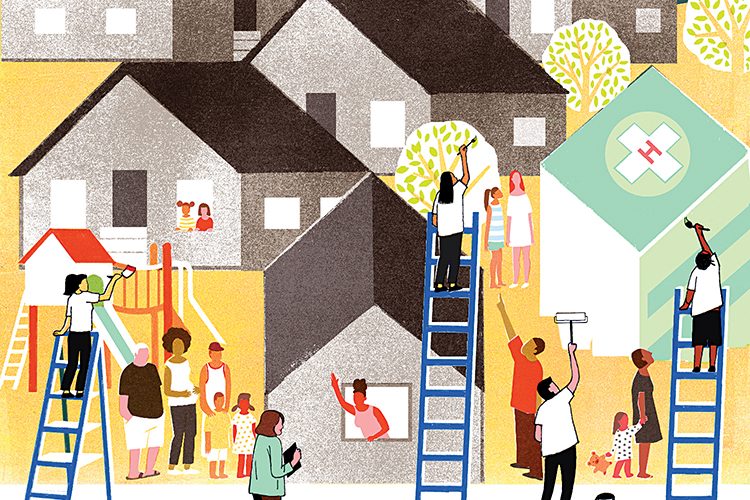Carol Redmond Naughton ’82 is helping to improve economic mobility, health outcomes, and racial equity by working with community leaders across the country.
In the United States, the annual aggregate cost of child poverty is $1.03 trillion, according to a recent study by researchers at Washington University in St. Louis.
“Poverty impacts children in a much more profound way,” Carol Redmond Naughton ’82, president of Purpose Built Communities, emphasized in her TEDxAtlanta talk. “In fact, eighty-six percent of children who live in neighborhoods of concentrated poverty don’t read at grade level by third grade, which is an accurate metric in terms of predicting high school graduation rates, community health costs, and the number of prison cells that we’re likely to need in ten years.”
Through Purpose Built Communities, Naughton and her team partner with local organizations in communities nationwide to improve neighborhoods and help break the cycle of intergenerational poverty. “Our goal is to transform places so that low-income families can achieve their full potential,” she explains.
Their efforts began in their own city, Atlanta, Ga., in 1995. The East Lake neighborhood was known as a pipeline to prison; the crime rate was 18 times the national average. Perhaps most troubling were the education statistics. Only 5 percent of fifth graders could pass the state math test, and the high school graduation rate was only 30 percent. “East Lake was a neighborhood that had ceased to provide opportunities for families to buy into the American dream,” Naughton says.
At the time, she had left private practice to join the Atlanta Housing Authority’s (AHA) legal team. Naughton was tasked with creating the legal and financial model for mixed-income housing — a new concept at the time. AHA teamed up with businessman Tom Cousins, who founded the East Lake Foundation after learning about the neighborhood’s struggles, and Eva Davis, who was president of the East Lake Meadows Resident Association. They formed a committee to develop a plan for progress. “But first we had to build trust,” Naughton says. “People were skeptical. We had to get to know each other.”
She was able to forge relationships with the community members, but it came about in unexpected ways. The first happened when she was headed to a neighborhood meeting and her son’s school called to say he was ill. So, Naughton ended up having to bring her nauseous 6-year-old with her to the meeting. “It turned out to be a great thing,” she recalls. “It changed how [the planning committee] looked at me. I was another mom, trying hard to balance work and professionalism.” Through this and other similarly humanizing situations, Naughton earned the residents’ trust. “As much as I hate to admit it, it wasn’t the fact that I was a great lawyer with a fabulous education and extraordinary negotiating skills that allowed me to build these relationships. It was the fact that I allowed myself to become vulnerable.”
Working with the neighborhood’s leaders and residents, the partners created a model that included mixed-income housing, a cradle-to-college pipeline, and high-quality health and wellness facilities with programming.
Today, crime is down more than 70 percent and incomes for families receiving the public housing subsidy are four times higher. “But it’s around education that we’re most excited,” Naughton says. Children attending the neighborhood charter school, which was once the lowest performing school in Atlanta, are competing at the highest levels in the state.
In 2001, Naughton became head of the East Lake Foundation, overseeing the various pieces of the plan. As the group’s data kept improving, they started garnering the attention of people around the country, including New Orleanians trying to recuperate from Hurricane Katrina. “That was our ah-ha moment,” she says. “We could create a consultancy group that could work with local leaders, because the work is complicated and it takes a long time, so having an expert consultant to work with is terrific.” Thus, Purpose Built Communities was born. They’re now working with more than 20 neighborhoods across the country, from Syracuse to Tulsa, and in discussions with approximately 40 more.
The neighborhood-focused approach is consistent across the country, but it is customized for each community. “In every place we’re invited, there are many strengths,” Naughton says. “So part of the early work is identifying the strengths and the community leaders who have been doing great stuff for a long time because we want to build on what’s working.” Naughton’s role is leading the consulting teams and working with civic and business leaders.
In her TEDx talk, Naughton remembered reading To Kill a Mockingbird at the age of 10. “I found the book on my kitchen table, sat down, and read it five times straight through,” she recalled. “I wanted to be like Atticus Finch. I wanted to be part of the team of people who were dealing with the hardest problems we had, part of the team that could be counted on to work through the things that were getting in the way of creating the kind of society where we all wanted to live.”
Naughton has dedicated her career to doing just that. “This work speaks to my soul,” she says. “I have an extraordinary belief in people, people who want to do better collectively to create opportunities for all of us. We can continue to do better. And, frankly, I think we must do better.”
A political science major, Carol Redmond Naughton ’82 recalls the Washington, D.C., Study Group: “It helped me understand what levers you can pull and what levers you can’t pull in order to drive change.”

